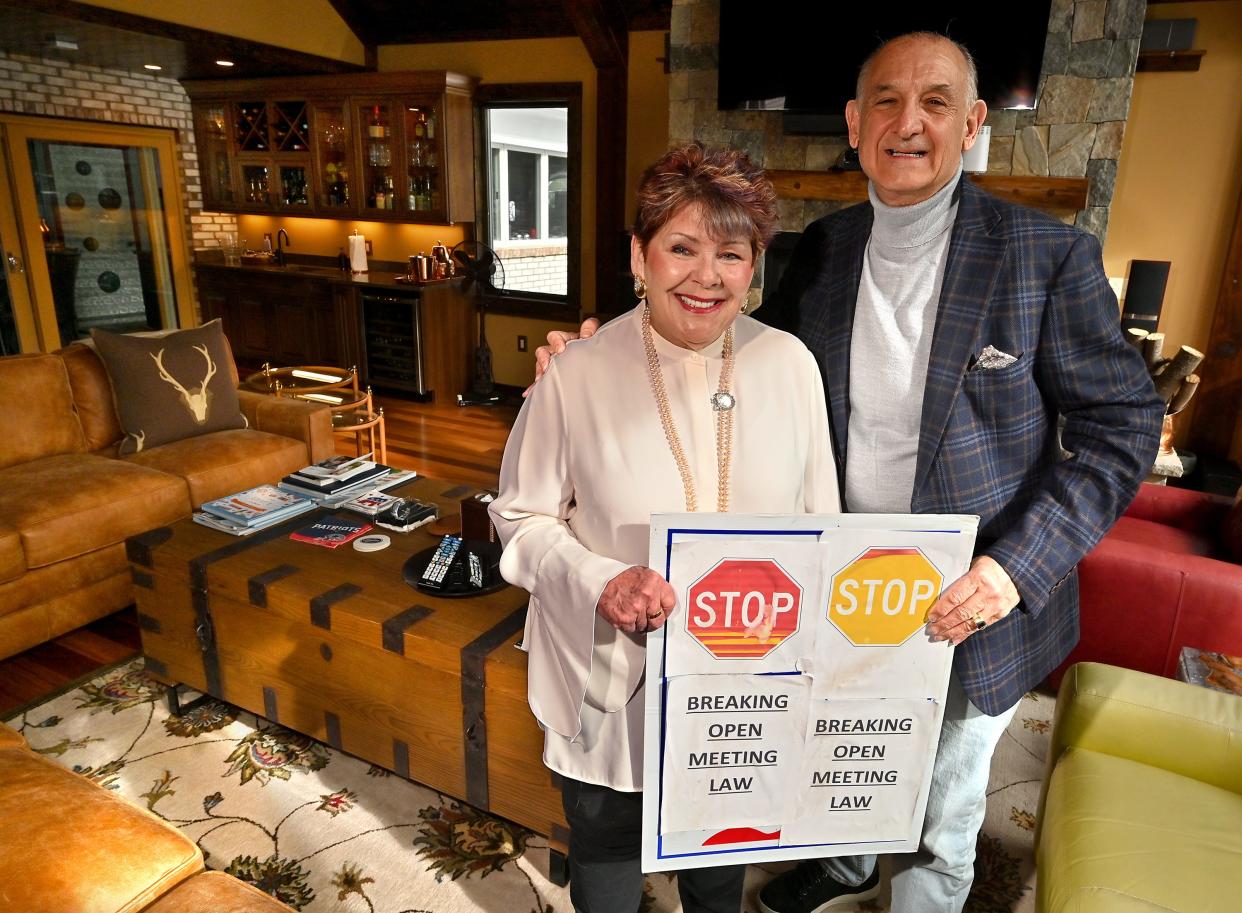Southborough resident who won before SJC is still fighting former selectman in court

SOUTHBOROUGH — More than a year after the Supreme Judicial Court ruled that the Southborough Board of Selectmen unconstitutionally silenced a resident during a 2018 meeting, the resident is continuing to seek monetary damages from a former selectman.
While the Supreme Judicial Court ruled in favor of Louise Barron on constitutional questions related to the board's handling of her speech and set a precedent for how Massachusetts municipalities can govern the content of public comment, the original civil case in Worcester Superior Court remains ongoing.
The civil case, which has been narrowed in scope since it was originally filed, will determine whether defendant Daniel Kolenda violated Barron's civil rights and is liable for damages.
A request for comment to Kolenda sent to his attorney, John J. Davis, was not returned.
At the heart of the case is a Dec. 4, 2018, meeting during which Louise Barron and Kolenda, the board chairman at the time, had a disagreement.
Barron came to the meeting with a homemade sign opposing tax increases and alleging violations of open meeting laws, which she repeated during public comment.
Kolenda interrupted Barron to say she was slandering town officials and that he would end public comment and go into recess if she continued to do so.
Barron responded: "You need to stop being a Hitler. You’re a Hitler. I can say what I want."
According to the original complaint, Kolenda turned off his microphone, called a recess and then berated Barron.
The complaint alleges that Kolenda told Barron, "You're disgusting," and said he would have Barron escorted out if she did not leave.
In addition, the complaint alleges that the selectmen improperly handled the minutes and audio of Kolenda's response to Barron.
State rules for Barron on records requests
As part of the discovery process, Barron and the Town of Southborough have been going back and forth on a series of records requests.
On Monday, state Supervisor of Records Manza Arthur agreed with an attorney for Barron, Jeremy Silverfine, that the town had not provided an adequate response to some of the records she requested. Arthur ordered the town to provide the relevant records on a rolling basis.
"I find the Town has not met its burden in responding to the request in accordance with (state General Laws)," Arthur wrote.
The records request at issue relates to the town's contract with Wi-Fi provider Fortinet, a company that employs Kolenda as senior legal counsel.
Silverfine wrote that the documents related to Fortinet could establish Kolenda's state of mind when he silenced Barron. She had been a critic of the town's fiscal management and Kolenda's "pet projects," Silverfine wrote. He suggested that Kolenda may have silenced Barron out of fear that she would uncover some violation of the law.
The Fortinet requests are just a part of the copious records requested by Silverfine. Davis, who also represents the Town of Southborough, argued the requests were unrelated to the ongoing case and that Barron was subjecting the town "to continued annoyance, oppression and undue burden."
On March 19, Silverfine filed a motion to compel the town to provide documents including:
All communications and documents sent and received from members of the Board of Selectmen, Town Administrator Mark J. Purple and Purple's administrative assistant from Dec. 4, 2018, to Jan. 4, 2019
Original drafts of Board of Selectmen minutes and agendas for the meetings on Dec. 4 and 18, 2018, and Jan. 2, 2019
The yearly budget history for the Town of Southborough Recreation Department from 2017 through 2020
Davis responded April 1, noting that the town is no longer a party to the lawsuit and accusing Barron of abusing the discovery process. He wrote that a previous subpoena already led to the town submitting 3,812 pages including documents similar to ones requested March 19.
"The town has fully, amply and cooperatively complied with plaintiff’s multiple discovery requests," Davis wrote. "Enough is enough. This court should deny plaintiff’s motion to compel."
Silverfine responded April 11, arguing that the town has been acknowledged as the relevant keeper of records even if it is no longer a party in the case. He wrote the documents were relevant to the case because they could reveal Kolenda's motivations.
"This is a civil rights case for damages and the Defendant’s state of mind is relevant to the jury’s decisions," Silverfine wrote. "(Kolenda's) motives are and will be illustrated at trial by his and other town leaders’ previous actions because this ugly incident did not happen in isolation."
Supreme Judicial Court ruling on civility rule
A trial date has not yet been scheduled in the civil case, but the dispute has already led to a landmark decision by the state's highest court, striking down rules that require "civility" during public comment portions of open meetings.
In 2020, Barron, along with her husband and another resident, filed a lawsuit in Superior Court against the town, the Board of Selectmen and individual members of the board.
Worcester Superior Court Judge Shannon Frison ruled in favor of the defendants in 2021, finding that Barron failed to show she had been deprived of her rights at the 2018 meeting.
The Supreme Judicial Court took up the case on appeal in 2022 and ultimately found that a resident has the right to accurately complain about violations of the law committed by town officials and to complain about other town actions.
The court also ruled that civility provisions for public comment violate the state's Declaration of Rights.
The American Civil Liberties Union of Massachusetts and PioneerLegal, the legal arm of the free-market think tank the Pioneer Institute, submitted amicus curiae briefs in support of Barron's case, and heralded the Supreme Judicial Court ruling as a triumph for free speech.
This article originally appeared on Telegram & Gazette: Southborough resident Louise Barron's civil case against ex-selectman

